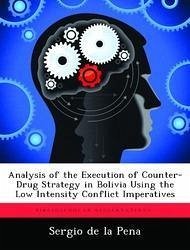This study investigates the actions of U.S. military personnel conducting the counter-drug mission in Bolivia in accordance with the Bolivian/U.S. Counter-Drug Strategy. The analysis determines if U.S. personnel, in executing their mission, are complying with the low intensity conflict (LIC) imperatives. These imperatives are (1) political dominance, (2) adaptability, (3) unity of effort, (4) legitimacy, and (5) perseverance. The study used Operations "Blast Furnace" and "Snowcap" conducted in 1986 and 1989 respectively as illustrative examples to analyze the execution of the counter-drug mission. The LIC imperatives are the doctrinally approved "truths" acknowledged as essential to the successful planning and execution of LIC operations which are: insurgency-counterinsurgency peacekeeping operations, combatting terrorism, and peacetime contingency operations. The counter-drug mission is a subset of peacetime contingency operations; therefore, the analysis provides a validation of the imperatives as an analytical tool. The study concluded that U.S. personnel did not comply with the LIC imperatives. The failure to comply has a direct correlation to the failure to stop the flow of cocaine from Bolivia.
Hinweis: Dieser Artikel kann nur an eine deutsche Lieferadresse ausgeliefert werden.
Hinweis: Dieser Artikel kann nur an eine deutsche Lieferadresse ausgeliefert werden.








